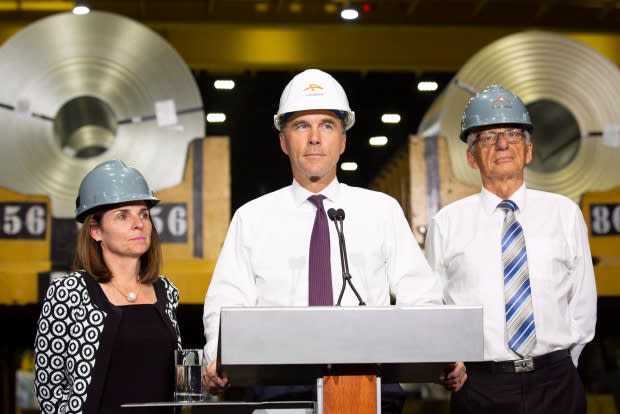Care to share that? Ottawa cuts steel deal with Mexico - but doesn't tell trade tribunal
The Department of Finance didn't inform the Canadian International Trade Tribunal investigating the merits of its emergency safeguards on foreign steel when it quietly signed an agreement to allow more Mexican steel to enter Canada without paying the surtax.
A memorandum of understanding (MOU) signed on Jan. 16 set new quotas for energy tubular products (such as those used to build pipelines) and wire rod imports from Mexico only.
Up to the new limits — which were set based on how much has been shipped to Canada historically, plus some negotiated room for growth — these two products will no longer face the 25 per cent surtax imposed last Oct. 25 on seven categories of steel products from countries that don't have free trade agreements with Canada. Surtaxes paid before Feb. 2, when the change took effect, will be refunded.
Between Jan. 7 and 24, the trade tribunal was holding hearings to gather evidence for an eventual recommendation to the minister on whether to continue with emergency safeguards on steel, which otherwise expire after 200 days. The tribunal's inquiry is based on the language of the federal cabinet's order in council that imposed the safeguards last fall — language that included a provisional surtax on these two categories of Mexican steel.
Legal counsel and other parties participating in the hearings — including domestic steelmakers, importers of foreign steel (including Canadian manufacturers) and representatives of foreign embassies — could have been interested to learn that these Mexican imports no longer face the extra cost. It's the sort of change that may have impacted what was presented to the tribunal.
The days when witnesses appeared to discuss wire rod and energy tubular products were after the MOU was signed on Jan. 16.
In a letter circulated by the registrar to "counsel and parties of record" on Feb. 22, the tribunal states that it was not notified of the MOU of Jan. 16.
"To be clear, the tribunal had no knowledge of any aspect of the MOU prior to, during or immediately following the hearing in this inquiry," it said. "The tribunal learned of the MOU when the information was released publicly by a media outlet in February 2019."
CBC News first reported the Canada–Mexico agreement on Feb. 14.
In a statement to CBC on Friday, Finance Minister Bill Morneau's office said that the tribunal's inquiry is "conducted in an arm's length, open and transparent manner for all participants to the inquiry" and pointed out that the government is not a participant.
Morneau's office said that any final safeguards imposed after the tribunal makes its recommendations would not necessarily mirror the provisional safeguards put in place for the first 200 days.
"It is important to note that, when requesting this inquiry, the government also requested that any final decision takes into account Canada's existing commercial agreements," spokesperson Pierre-Olivier Herbert wrote.
Mexico strongly objected to surtax
Last fall, emergency safeguards were imposed on seven specific kinds of foreign steel using an emergency tool the finance minister had never deployed before.
Canada already had dozens of trade remedies (like anti-dumping duties) in place to protect its domestic steelmakers against shipments from countries like China, which has been caught selling steel at unfairly low prices.
Morneau justified the additional surtax as part of a push to curb global overproduction and prevent cheap steel from sneaking into North American supply chains.
Once the U.S. imposed its 25 per cent "national security" steel tariffs earlier last year, there was a risk that at least some foreign steel originally destined for the American market could be dumped into Canada instead.
The Mexicans strongly objected to two of their major steel exports being included in Canada's emergency safeguard measures.

When contacted by CBC News earlier this month, Morneau's office said the MOU was "in recognition of Canada and Mexico's mutual rights and obligations under NAFTA."
A revised North American trade agreement was signed by both countries on Nov. 30, after several tense months of negotiations. It is not yet ratified.
Finance did not issue a press release, nor did it hold a public event, to reveal that steel negotiations with the Mexicans had concluded with this signed MOU.
The Mexican embassy in Ottawa confirmed to CBC News that an agreement was reached and shared a copy of the MOU.
CBC News reached out to the tribunal Friday for additional information about the letter it circulated.
"The tribunal does not comment on its inquiries and the public record speaks for itself," replied Haley Raynor, its deputy registrar.
The tribunal is expected to report no later than April 3.

